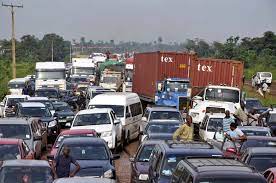At a time when Nigeria is faced with a cash crunch and rising debt profile, Lagos State, Nigeria’s commercial hub centre, is estimated to be losing N4 trillion yearly to traffic congestion.
A report tagged the ‘Behavioural Causes of Traffic Congestion in Lagos,’ which was carried out by the Danne Institute for Research, believes that such a huge sum if saved, could be used to fund education, provide healthcare services, complete railway projects, and build other infrastructure in the state.
Speaking in Lagos on Wednesday at the presentation of the Report, funded by the Bank of Industry and Africa Finance Corporation (AFC), Franca Ovadje, executive director of Danne Institute for Research, said connectivity is very important for productivity.
Ovadje said despite having a population of 21 million, Lagos is not seeing corresponding productivity due to poor connectivity that kills man-hours of traffic jams experienced by residents in the state.
According to her, Lagos State should be getting high productivity because a report states that if the population doubles in developing countries, productivity should grow by 5 to 6 percent.
“Interestingly, 35 percent of our respondents said their number one challenge in living and working in Lagos is the traffic congestion. We also found that the top three main causes of traffic congestion in Lagos are behavioural. These include bad road infrastructure, disregard for traffic laws, activities of agberos at the bus stops, and buses picking passengers.
“We also asked the respondents the three things they would do if they were Governor of Lagos State to solve the traffic problem; they said they would construct, repair and maintain roads; ban agberos from the road and enforce traffic laws,” Ovadje said.
While calling on the State Governor, Commissioners of Transport, and Physical and Urban Planning to look at the views and recommendations of the respondents in the report, she said Lagos State will make a lot of internally generated revenue from enforcing traffic laws in the state.
She said finding solutions to the traffic situation in Lagos should be on the front burner to enable the residents to tap from the opportunities in the state and attract investments.
“Lagos is losing a lot of talents to japa syndrome and is due to traffic frustration in the state and if this continues, there would be nobody left to turn the state’s economy around,” she said.
Earlier, Fola Fagbule, head of financial advisory at Africa Finance Corporation, said the corporation was happy to support the tremendous work done in the report, and hopes it serves as a guide to policy-making for the state’s good.
On his part, Ayodele Ositimehim, director of Traffic Management and Survey for LASTMA, said the government needs to be intentional in handling agberos collecting money on Lagos roads.
According to him, the agberos have no business on the road rather they can go into parks to collect money.
He said this would put an end to stopping vehicles that on transit to collect money and causing obstruction to vehicular movement.
READ ALSO: Why We Attacked Adamawa Police HQ – Nigerian Army
Ositimehim also blamed poor town planning for the traffic congestion on places like the Lekki-Epe Expressway.
Akin-George Fashola, head of the directorate at Vehicle Inspection Service, said the Lagos State Government is concluding works on the Lekki Coastal Road Construction, which would soon be completed to support the operations of Lekki Deep Seaport and Dangote Refinery.
Meanwhile, the report revealed that Lagosians spend an average of 2.21 hours on the road to get to work each day, while 45 percent of the respondents spend more than two hours to get to work. The worst hit is the people who live in the Ajah, Etiosa, and Apapa areas of Lagos compared to those who commute from Surulere and Yaba.
It, however, suggests the State Government needs to construct, repair, and maintain roads to prevent traffic jams. It said that road construction and repairs should be done at night, and alternative roads should be created during construction.
It also enjoined the government to enforce traffic laws as the third most important solution, even as it said that enforcing traffic laws requires political will on the part of the government.



























